




Midwives, told in November they would no longer be allowed to deliver babies, now have the option under OB/GYN super vision
By JESSICA MORDACQ Staff Reporter
The future of midwives who once delivered babies at West Suburban Medical Center is still uncertain as community members fight to reinstate their services.
West Siders, public officials and staff working at West Suburban Medical Center held a press conference at the hospital Jan. 6 to continue speaking out against the loss of midwives and family medicine doctors’ birthing privileges, which were repealed last month. These medical professionals are a part of the PCC Community Wellness Center, which West Suburban contracts for services.
Many locals say this move reveals the stark truth about birthing inequity on the West Side of Chicago, since PCC’s labor and delivery services of fered comprehensive birth plans for patients living there.
“This is more than a policy failure – it’s a blatant attack on the health and dignity of women in our communities,” said 1st District Cook County Commissioner Tara Stamps in a statement announcing the press conference. “When community hospitals end 30-year partnerships with anchor organizations, like PCC Wellness
See WEST SUB on page 8


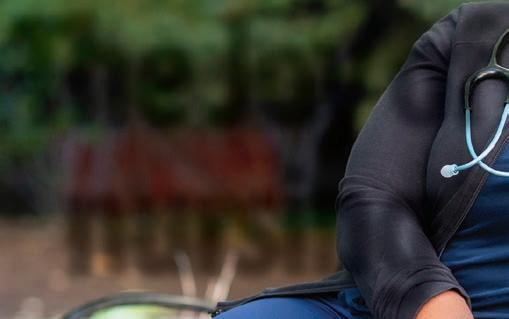

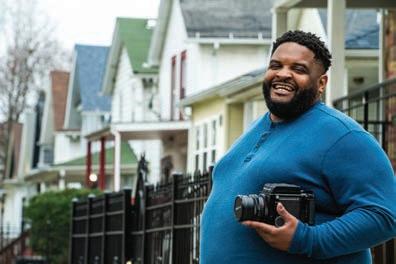
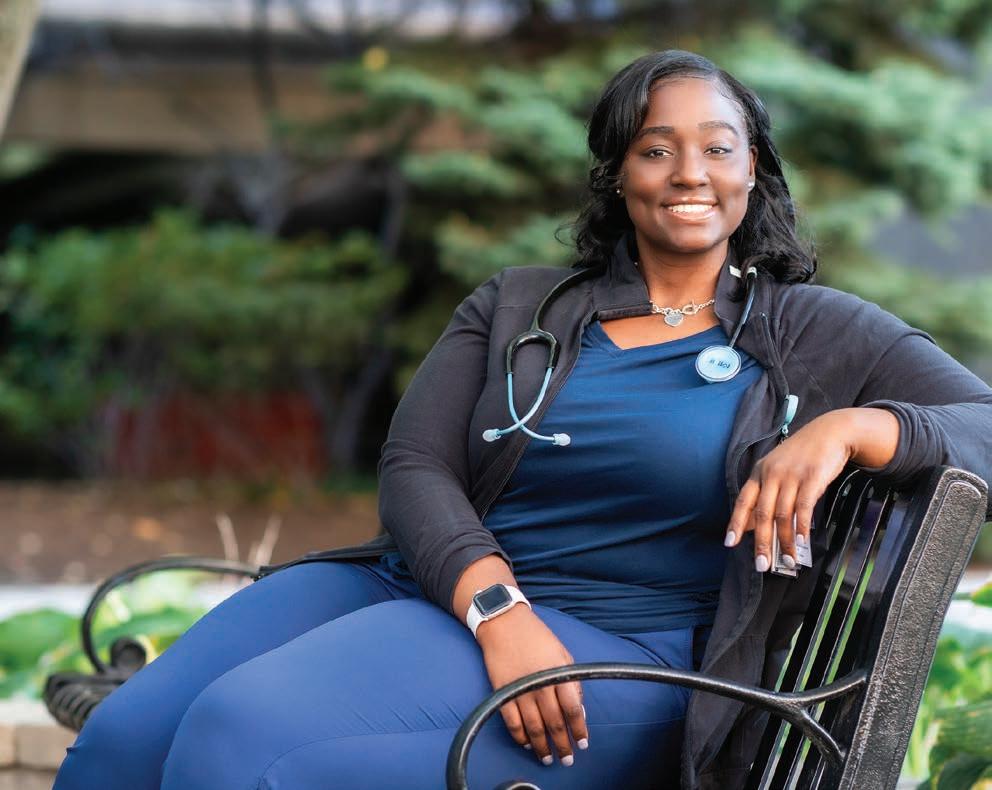
By JESSICA MORDACQ | Staff Reporter
At the end of 2024, Advocate Illinois Masonic Medical Center in Lakeview announced its nurse of year: Joy Adams, an Austin resident known for her warmth and effervescent smile.

Adams has worked at Advocate Illinois Masonic Medical Center for about 7 years. Today, she’s a re gistered nurse in surgical intensive care, where she supports patients recovering from surgery and critical medical events, and
JOY ADAMS on page 4





Positivity rates are on a “deep upslope,” while COVID-19 is also trending up
By MACK LIEDERMAN Block Club Chicago
The weather turned cold and flu season has arrived.
Chicago has seen a spike in respiratory illness cases over the past month, according to data kept by the Chicago Department of Public Health.
Among Chicagoans tested for flu-like symptoms, 18.3 percent were positive for influenza, 14.1 percent for respiratory syncytial virus, or RSV, and 4.9 percent for COVID-19, according to the data as of Friday.
“Flu and RSV are both significantly elevated in Chicago right now, and COVID levels are increasing as well,” city health department spokesperson Jacob Martin said in a statement. “Respiratory virus season is in full swing.”
Local hospitals have elevated masking requirements for the seasonal spike in cases. As of Dec. 23, University of Chicago Medicine is requiring all staf f to wear masks in patient areas, according to an internal memo.
OSF Healthcare, which includes Little Company of Mary Medical Center, 2800 W. 95th St. in Evergreen Park, is temporarily limiting hospital and hospice visitors to two adults per patient at a time, “with exceptions for special circumstances,” spokesperson Colleen Reynolds said in a statement.
Michael Lin, an infectious disease physician and professor at Rush Medical Center, said the “deep upslope” in cases is typical for this time of year.
“Respiratory viruses tend to spike in the winter months, primarily when people are gathering indoors, spending more time together and possibly spreading viruses,” Lin said.
Vaccines to protect people through the winter season are rolled out in the fall, but it’s not too late to get a flu shot or an updated COVID-19 booster if you haven’t already,
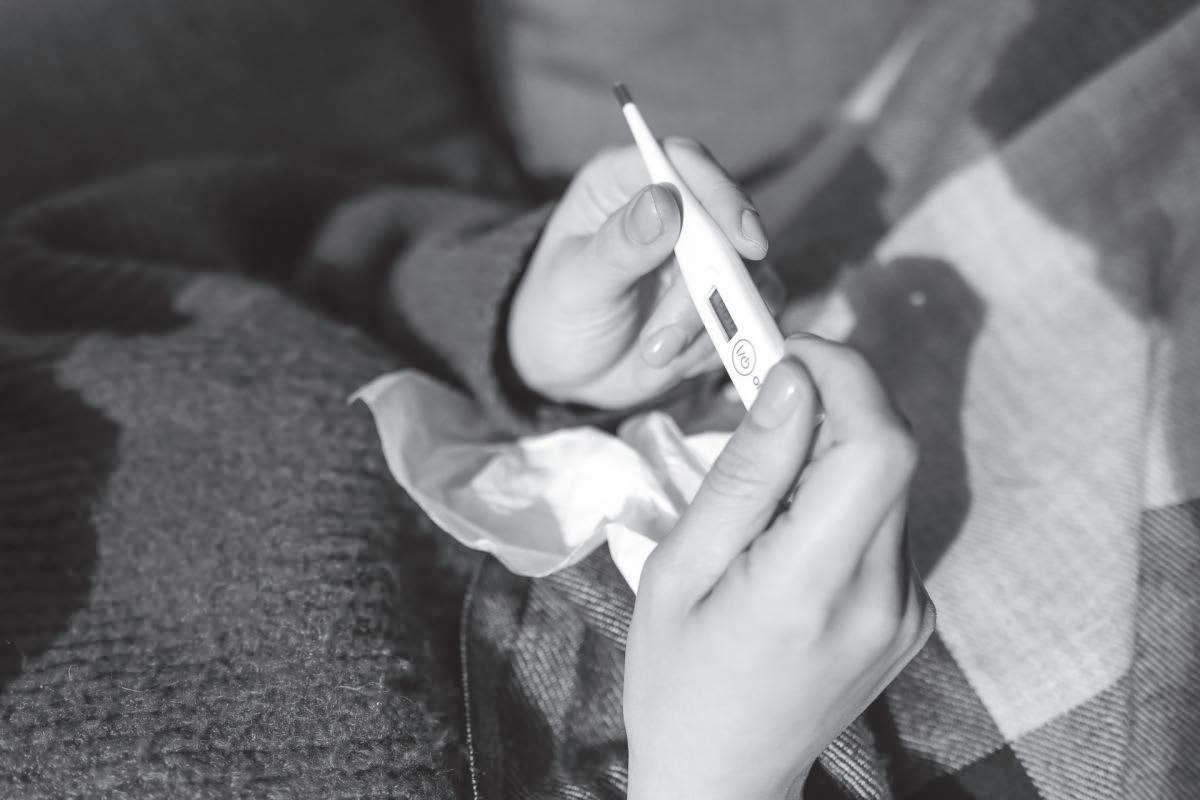

Editor Erika Hobbs
Sta Repor ter Jessica Mordacq
Assistant Editor, Ar ts & Enter tainment Dalal Or fali
Contributing Editor Donna Greene
Digital Manager Stacy Coleman
Digital Media Coordinator Brooke Duncan
Reporting Partners Block Club, Austin Talks
Columnists Arlene Jones, Aisha Oliver
Design/Production Manager Andrew Mead
Editorial Design Manager Javier Govea
Designers Susan McKelvey, Vanessa Garza
Marketing & Adver tising Associate Ben Stumpe
Senior Media Strategist Lourdes Nicholls
Business & Development Manager Mary Ellen Nelligan
Circulation Manager Jill Wagner
Publisher Dan Haley
Special Projects Manager Susan Walker
“Going to events a little bit ill can cause a lot of spread. If your child is sick, keep them away from other children. Do what’s practical.”
MICHAEL LIN
Infectious disease physician and professor at Rush Medical Center
Lin said.
RSV vaccines are recommended for adults 75 years and older and those 60-74 years old with increased risk, according to the CDC. For infants — who face greater risk of severe RSV — there is a maternal vaccine given during pregnancy or an RSV antibody given to infants after birth.
The golden rule: If you feel sick, stay home, Lin said.
“Going to events a little bit ill can cause a lot of spread,” Lin said. “If your child is sick, keep them away from other children. Do what’s practical.”
Lin recommends masking in crowded areas for people with underlying conditions that could make respiratory illnesses more severe. For others, masking is “really a personal preference after that,” Lin said.
At-home testing kits for respiratory illnesses are increasingly available, Lin said.
While COVID-19 is not as common as the flu and RSV at the moment, it’s unclear when those cases may spike, too, Lin said.
“It’s becoming one of the common respiratory viruses, but it hasn’t settled into a pattern seasonally yet. It’s harder to predict when it’s going to strike,” said Lin, who noted there was a surge in COVID-19 last summer. “It’s not behaving yet like a classic respiratory virus.”
Much is still unknown about the longterm effects of COVID-19, Lin said.
Peak season for respiratory illnesses usually falls of f by late April or early May, Lin said.

BOARD OF DIRECTORS
Chair Eric Weinheimer
Treasurer Nile Wendorf
Deb Abrahamson, Gary Collins, Steve Edwards, Judy Gre n, Horacio Mendez, Charles Meyerson
Darnell Shields, Sheila Solomon, Audra Wilson HOW
60302
CIRCULATION Jill@oakpark.com ONLINE www.AustinWeeklyNews.com Austin Weekly News is
An ever-present smile from page 1
expansion RESCUE, traveling around the hospital to help staf f on units that need it. Her previous positions included a crew nurse, working in several of the hospital’s units and, in 2020, as an extension ICU COVID nurse, helping that unit’s nurses with patients who were intubated.
Out of over 1,200 nominations across Advocate hospitals, Adams won nurse of the year at Illinois Masonic after a peer committee blind reviewed the nominations and chose her based on her commitment, passion, solution-oriented abilities and evidence-based practice, according to a statement.
“Joy’s unwavering dedication, exceptional leadership, and clinical expertise truly embody the heart and soul of the nursing profession,” Heather Hwang, chief nursing officer of Advocate Illinois Masonic Medical Center, said in a statement. “Being named Nurse of the Year is a testament not only to Joy’s outstanding

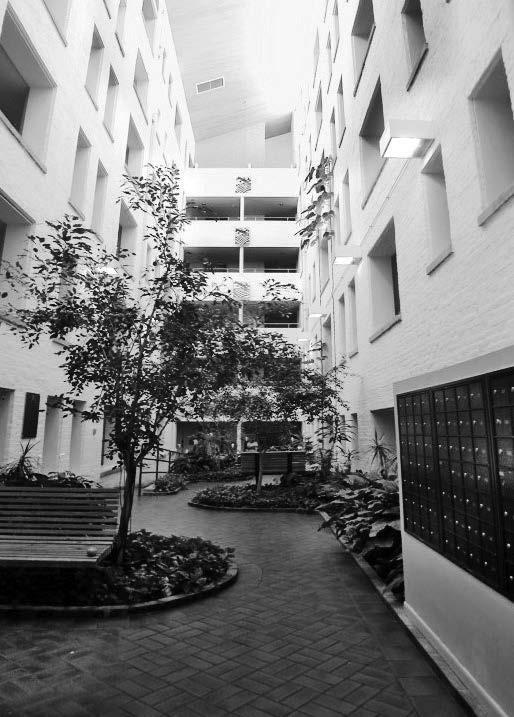
“Joy ’s unwave ring dedication, exceptional leadership, and clinical expertise truly embody the heart and soul of the nursing profession.”
HEATHER HWANG
skills but also to the profound and lasting impact she has on her patients, colleagues and the nursing community.”
Though she was excited and shocked to find out that she won, Adams said she thinks she got the award because of the effort she makes to ensure patients are comfortable
“I make sure that I speak to everyone,” Adams said. “I make sure that I smile.”
Being there for patients’ families is one of Adams’ favorite parts of her job in the
surgical intensive care unit. She added that getting to see a patient’s recovery journey after surgery is also inspiring.
While Adams said there have been countless examples of these moments throughout 2024, one sticks out to her: She tells the story of a sick patient who didn’t make it.
Before he died, he was surrounded by his family, who asked if their dog could say goodbye to the man.
“The patient was able to hug the do g for the final moments of him living,” Adams said. “That still touches me because that little thing meant so much to the family.”
Adams grew up in Lawndale. Her family moved to California for some of her childhood, but she moved to South Holland before coming to Austin about four years ago.
Adams knew she wanted to be in healthcare since she was small and watched surgeries on TV hospital shows. She thought she wanted to be a surgeon, but that changed after she started working in rehabilitation at the end of her Certified Nursing Assistant program.
“I saw how much the nurses were in-


Our beautiful 6-story building provides quality, a ordable, independent housing for seniors. e Oaks o ers studio and one-bedroom apartments, with kitchens and private bathrooms. Amenities include an award winning interior landscaped atrium, central meeting room, library, laundry facilities, computer learning center, internet access, electronic key entry system, and parking.
On-site management includes 24/7 emergency maintenance service and a senior services coordinator who is available during business hours to assist residents in accessing service
volved,” she said, and how much they helped people. So, she went back to school to become a nurse while working as a CNA.
“The people around me inspired me just to want to learn more and how much of an impact that I can make being an actual nurse,” Adams said. “You see so many people who lack information, healthcare, experience, and things like that. Why not have nurses who are willing to help?”
Adams also credits her managers at Advocate Illinois Masonic Medical Center for teaching her how to be the person she is today in the healthcare field and propelling her career.
“Not only do they give you awards,” Adams said of the hospital, “but they inspire you to grow, to be better, to make change.”
In December, Advocate Illinois Masonic Medical Center held an awards ceremony and gave Adams a certificate.
“Advocate Health nurses are committed to delivering exceptional, evidence-based and equitable care for all,” Jane Dus, senior vice president and chief nursing officer of Advocate Health’s Midwest re gion, said in a statement. “It is a true honor to witness the remarkable impact they make in transforming lives through innovative and compassionate care every day.”
agencies and programs designed speci cally for seniors. e Oaks is owned and operated by the Oak Park Residence Corporation and is funded by the US Department of Housing and Ur-ban Development through the 202/ Section 8 Program. Monthly rent is based on the resident’s income, with individuals paying approximately 30% of their monthly income toward rent.
For more information, please visit us at www.oakparkrc.com or contact us at 708-386-5862.

By AMALIA HUOT-MARCHAND Medill Illinois News Bureau for Capitol News Illinois
Illinois lawmakers could soon make it easier for children in foster care to live with their relatives or other people close to them.
Child welfare experts have long touted the benefits of foster children staying with kin. Advocates say those arrangements offer children more stability, decrease the trauma they experience, improve their mental health and reduce the number of times the child is moved from home to home.
But both state and federal law often made those placements impractical. To get paid to support the children, relatives had to follow the same stringent rules that apply to other foster parents. They go through a rigid home inspection with bedroom size requirements, as well as restrictions on the number of people and gender of individuals who can sleep in the same bedroom. Prospective parents also go through lengthy classroom training.
In 2023, though, the federal government decided to allow states to use separate standards for relatives of children in foster care than for other foster parents, in an ef fort to pair more children with relatives.
Now, Illinois lawmakers are moving forward with a plan to do just that, along with making other changes that will encourage the placement of children with relatives. The Illinois Senate unanimously approved the measure, known as the Kinship in Demand, or KIND Act, in the fall. But the House must sign of f on the changes by the time it adjourns in early January, otherwise the bill must go through the entire legislative process again to reach the governor’s desk.
“I think it’s really important that we reckon with how unjust our systems have been in foster care,” said state Sen. Mike Simmons, D-Chicago, one of the bill’s 15 co-sponsors in the upper chamber. “It’s an excellent step forward in ter ms of respecting the integrity of the families these kids come from, that includes their immediate family but also their extended kin that love them.”
Close to 10,000 children – or more than half of the total number of kids in the care of the Illinois Department of Children and Family Services – live with family members.
But more than 60% of those families are not eligible for monthly foster care payments, annual clothing vouchers, or foster care support groups according to the ACLU of Illinois.
“Support for kin, for relatives who have not received the same kind of support that foster parents do, for example – I’m talking about monetary support – I think is a very important component of dealing with the amount of time a child spends in the custody of DCFS. We want to make sure they get back to a home environment as fast as they can, and this is a way to encourage that,” said Illinois Gov. JB Pritzker, a Democrat, in a news conference on Dec. 11.
Casey Family Programs, the nation’s largest foundation focused on foster care, states that prioritizing relative care givers decreases sibling separation, reduces the risk of abuse and gives a higher chance of achieving per manency.
Placing foster children with relatives could also help Illinois do a better job in finding permanent homes for children in its care. Illinois’ foster care system ranked in the bottom third of states in 2019 for children placed in permanent homes, according to the U.S. Department of Health and Human Services. Between 2017 and 2021, the number of children who were placed in a permanent home decreased by 7.8%, according to the 2021 Child Welfare Outcomes Report to Congress.
T he KIND Act would allow DCFS to pursue additional federal funding in order to apply a kin-first approach. DCFS would use the federal money to put more ef fort into finding f amilies of foster children, notifying them and improving support services, as well as doing background and identity checks
“By promoting kinship care and addressing systemic issues with a long length of time to permanency and insufficient support of foster care, the KIND Act aims to improve safety, stability and the well-being of children in DCFS care,” state Sen. Mattie Hunter, D-Chicago, a primary sponsor of the bill, said during a November Senate Judiciary Committee hearing.
Payments for relatives particularly impact Black children, who are over represented in the foster care system.
In Illinois, as of October, more than 18,000 children were in the DCFS system; more than 8,000 of them were Black. In terms of proportional representation, Black children have a 250% higher chance of being placed in DCFS care, according to the School of Social Work at the University of Illinois Urbana-Champaign.
The poverty rate for Black Illinoisans is 27.7% compared to 8.5% for white Illinoisians. Preventing these families from accessing government subsidies for foster care adds on additional hardships and repeats the cycle of poverty they face, according to the University of Alabama Institute for Human Rights
“We know that the vast majority of kids who are coming in are over represented, and the KIND Act is removing financial barriers for relatives being able to care for kids,” said Nora Collins-Mandeville, director of systems reform policy at the ACLU of Illinois, in an interview.
“Relatives who are coming forward have considerably less resources than a foster parent would. And so the fact that we’re not even, in our current system, paying those relatives the same amount that we pay a stranger to care for a child, it’s pretty frustrating,” she said.
Under the KIND Act, there would also be a different criminal background criteria for relatives and foster parents. The federal government allows DCFS to waive “nonsafety-related licensing” for relative care givers on a case-by-case basis. Relatives would be subject to a personal analysis assess-


Consigning your furniture and home decor is a smart and rewarding choice. It’s also the ultimate support of a local business because the suppliers are local, the shoppers are local, and the sta is local too!
Let’s unpack other advantages of consignment to see if this might be for you.
One signi cant advantage is the opportunity to declutter and refresh your living space, making room for new, exciting pieces. How many people have visited your home and commented on a sofa, dining room table or a fabulous piece of decor? If you have great taste, other people are looking to create the same look in their homes.
By consigning, you reduce waste, contributing to sustainability and promoting a circular economy. It sounds trite to say you’re saving the land lls, but well, you actually are!
Financially, consigning allows you to earn money from items you no longer need or want. So it’s a win-win situation: buyers get high-quality items at a fraction of the cost, and you gain extra cash.
Leveraging the expertise of consignment professionals can help your items sell quicker and for a higher price than DIY marketplaces. Top notch Consignment Stores have websites, utilize the power of LIVE video selling and work with marketing agencies so your pieces gain national exposure. ey have arrangements with shipping companies so your items don’t just sell locally, they sell nationally.
Kellie Scott is a past year Top 10 Power Player of Chicago. She owns Divine Consign, a multi-time winner of the Best of the Best Awards for Furniture Consignment Stores. Kellie makes the consignment process easy and hassle free. Start with the online pre-approval form at: divineconsign.com/ consign-form/
Kellie Scott, Owner Divine
Consign
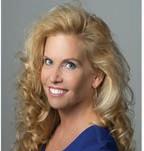
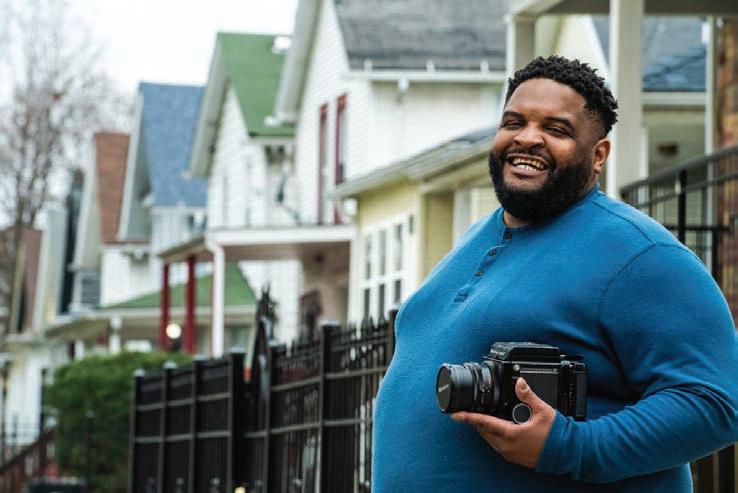
COLIN BOYLE/BLOCK CLUB CHICAGO Community photographer Kenn Cook Jr. photographs his Austin neig hborhood.

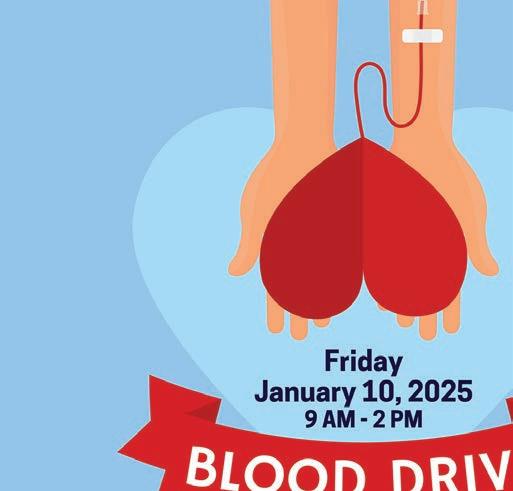


Cook aims to expand his #MyWestSideStory Collection while providing family photo sessions and ar t walks
By MICHAEL LIPTROT Block Club Chicago
A West Side photo grapher is partnering with an area library to expand his vision of neighborhood storytelling Kenn Cook Jr., a photo grapher and Austin native, has been named artist-in-residence for Le gler Re gional Library, 115 S. Pulaski Road, according to Cook and the city’s Department of Cultural Af fairs and Special Events










A kickoff event is planned for 2-7 p.m. Jan. 16 to debut an open studio space for Cook at the Garfield Park library and launch related programs that will run throughout 2025, according to Cook and DCASE officials.
Cook told Block Club he was ecstatic to learn that he was selected for the residency, and he plans to use the resources provided to expand his #MyWestSideStory collection. His photography project seeks to bring awareness to stories of West Siders through intimate, black-and-white photos, he said.
“As an artist, one of the hardest things is finding the support for your projects,” Cook said. “I want to take the ‘My West Side Story’ project and turn it into our West Side story, where I work with the community to tell their stories themselves through archival images, handwritten notes and audio recordings.” Building community is the focus of Cook’s year as artist-in-residence at Legler,
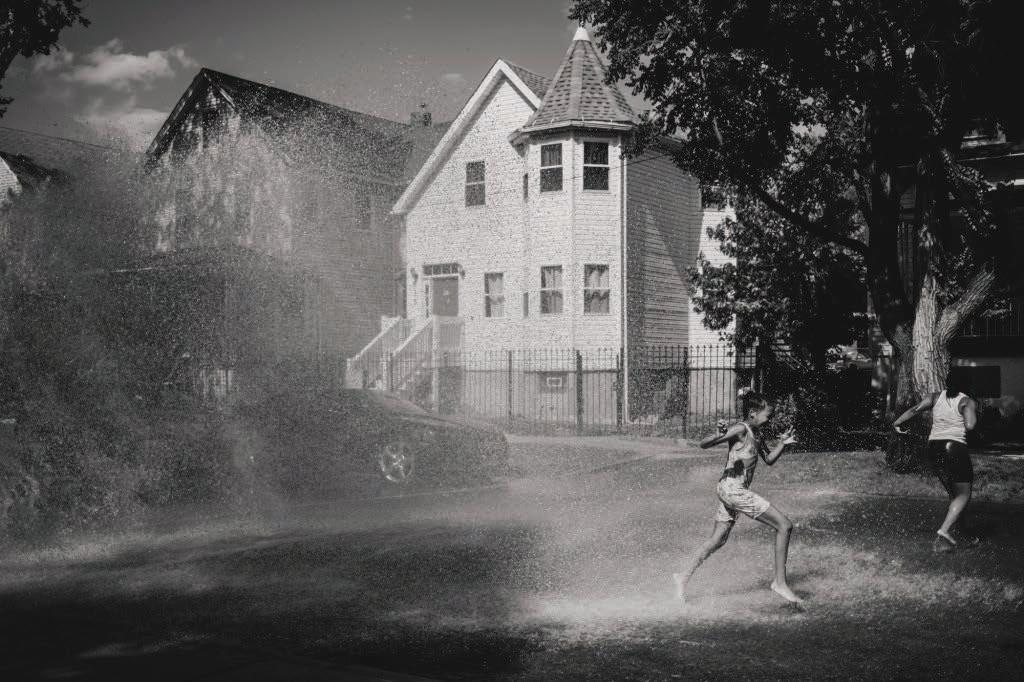
on the rst 100-degree day of 2024.
handwritten notes and audio recordings.”
Building community is the focus of Cook’s year as artist-in-residence at Legler, with the primary goal of creating an online archive of community photos, he said.
Library visitors will be able to bring thei r family photos to be digitized and stored online. Cooks aims to “take a screenshot of this time in the history of the West Side and times before” to show positivity throughout the community and counter negative portrayals by mainstream media, he said.
Another goal of Cook’s residency is to produce a zine titled, “From The West Side With Love.” He envisions the zine to be a high-quality photo book of some of his bestreceived images — among them, children playing in a fire hydrant and West Side cultural landmarks like the Austin Town Hall Park fieldhouse at 5610 W. Lake St. Cooks intends to release the zine for his birthday in May, he said.
A third component of his library residency will be community outings and art walks, Cook said. He’ll lead groups of community members on guided tours to see and photograph landmarks and iconic landscapes on the West Side
This component of his residency is inspired by previous art walks he held with middle schoolers at Nash Elementary, Cook said.
“I just wanted the kids to see the beauty in their community,” he said.
Ultimately, Cook hopes his work inspires pride in living on the West Side and a real-


ization among Legler visitors of the beauty around them, despite negative narratives about the surrounding neighborhoods.
“At the core of my work, I’m working to combat displacement. I want people in our community to have a special love and pride for the West Side that we hold on to,” Cook said.
Leading by example, Cook emphasizes his own family in his work. He and his wife Rebecca decided to buy a home in Austin to “show that people can get married, be successful and still live on the West Side,” he said. His newborn son, Pharoah, is also the focus of much of his photography
“If a few families see this work, find some love in their heart for the West Side, see the beauty in the West Side and just stay, I’ll be happy with that,” Cook said. “I want people to stay, live in and develop the West Side.”
Following the Jan. 16 kickoff event at Legler for Cook’s residency, the photographer plans to host an open studio weekly, with the hours to be announced.
Cook encourages people looking to become involved in his #MyWestSideStory project to contact him at kenn@bykenncook. com and view his work at kenncookjr.com
Chicago Public Libraries launched its artist-in-residence program at Legler in 2022 with Haitian American artist Alexandra Antoine. The two-year residency uses art to connect neighbors with resources at the library.
More information about Cook’s residency will be on Legler Regional Library’s website



from page 1
Community Center, they send a dangerous message: that the lives of women, particularly Black women, do not matter We will not stand by as vital resources are stripped away from our families and neighborhoods.”
“This is more than just a breach of care. It is a betrayal of this community,” said Christina Waters, Oak Park’s clerk who delivered her three children with the help of PCC family physicians and midwives at West Suburban, at the press conference. “Expectant mothers now face increased risks of complications due to this unnecessary disruption, all while leadership at West Suburban remains silent about the true reasons behind this decision.”
West Suburban CEO Manoj Prasad told PCC midwives and family medicine doctors in November that they would no longer have birthing privileges because of issues related to liability insurance. Dec. 6 was the last day they delivered babies at the hospital.
But last month, Prasad said PCC midwives could still deliver babies at West Suburban under the supervision of OB/GYNs – instead of with PCC physicians as before. Prasad said this was an offer he verbally explained to PCC’s chief medical officer Paul Luning in November, but Luning declined it Luning said this was not offered to him, in writing or orally, that Prasad told him PCC providers could no longer deliver at West Suburban, period.
“He made it clear that family doctors and midwives would not be able to deliver at West Suburban at all,” Luning said. “I did not hear anything at all about him changing his mind and allowing midwives to deliver again until we met with a group of politicians” in early December.
A letter obtained by Growing Community Media – the parent company of Wednesday Journal and Austin Weekly News – that Prasad wrote to Luning in November reads, “Labor and delivery privileges may be exercised only by OB/GYN residency trained physicians.” Prasad added, “This has become standard in our community and is in the interest of quality patient care.”
But Luning said there are several hospitals that allow other providers to deliver babies, not just OB/GYNs.
“Any language that he has put out there about how this reflects the culture of Chicago and the legal climate, that is simply not true,”
Annette Payot, director of midwifery for the PCC Community Wellness Center, previously told GCM about Prasad.
“For him to say that’s not the standard care for midwives is crazy, and family docs
are delivering at lots of different hospitals in Chicago,” Luning said. He added that five Chicagoland hospitals have reached out to PCC midwives and family medicine physicians to express their astonishment at West Suburban revoking their birthing privileges, offering for them to come deliver at their hospitals instead
At West Suburban, births that were once assisted by two attending physicians, a midwife and resident doctors are now administered by just an OB/GYN – either a PCC OB/GYN or one that’s a part of a hospitalist group Prasad hired last summer – and resident doctors. But Luning said that PCC providers are against the idea of midwives returning to the current state of the hospital’s labor and delivery unit.
“We object to the idea of midwives being supervised, working underneath an obstetrician,” Luning said. “We believe that midwives are well-trained in providing obstetrical care and should function as partners with consultation, but [Prasad’s] making it clear that the midwives would be essentially doing the scut work.”
Luning added that it is not clear how the logistics of OB/GYNs supervising midwives or the billing would work. And he said the new collaboration wouldn’t have the same continuity of care that patients received when PCC midwives and family physicians worked together to deliver babies.
“We’re all part of the same outpatient prenatal care group,” he said of PCC providers. “We do the postpartum care. It’s completely inte grated, and we work in concert together,” rather than an OB/GYN telling them what to do.
PCC providers have asked to see a copy of the insurance policy that recommends they shouldn’t be allowed to deliver babies at West Suburban. Prasad provided them with one dated Oct. 30, but the name of the insurer was redacted. Luning said the insurance policy suggestion was especially confusing, since PCC providers have their own malpractice insurance.
“We’ve been doing this for 33 years. Why have we not heard about this until this man bought the hospital and took complete control?” Luning asks. “We don’t have a lot of confidence in the words that he says out loud, and so it’s very hard for me to have any feeling that the hospital is a safe place for our patients to deliver.”
“Health care is not a privilege; it is a right. This community deserves better than disinvestment, neglect, and silence,” Waters said at the press conference. “We demand the reinstatement of midwifery and family medicine services, investment in staffing and facilities, and – most importantly – transparency from those in charge.”
By DEBORAH BAYLISS Contributing Reporter
January is National Poverty in American Awareness Month, and as such is a time for some local advocates to assess what is being done or not being done to reduce poverty.
The Illinois Department of Health and Human Services recently released its 2024 annual report highlighting the work of the Interagency Working Group on Poverty Elimination and Economic Security and the Illinois Commission on Poverty Elimination and Economic Security.
According to the report, the highest number of households living in deep poverty reside in the Chicago metropolitan area (Cook, DuPage, Lake, and Will Counties).
The report further points out that those experiencing deep poverty often suffer from stagnating wages, health and disability, limited childcare and institutional barriers to employment. When individuals do work, the work is often unreliable, and pay is insufficient to meet basic costs of living, the report stated.
from last year. T he current federal minimum wage of $7.25 an hour has not increased since 2009 when it rose from $5.15 an hour
Supporting small businesses is also key, Ford said.
“I think we need to do everything to support our businesses so that they can hire more people,” he added. “It’s critical. People can’t begin to climb out of poverty if they don’t have a job.”
A focus should also be on connecting those who are unemployed to trades like education and the medical field so that they can have a decent paying job, Ford added.
“There’s a need for nurses and nurses assistants, teachers assistants, early childhood education,” he said. “I think if we can make sure we connect people to the workforce and education, we can help them climb out of poverty.”
“If we can make sure we connect people to the workforce and education, we can help them climb out of povert y.”
L ASHAWN K. FORD Illinois State Rep.
There were 36.8 million people in the United States in poverty in 2023, not statistically different from 2022, according to the U.S. Census report Poverty in the United States issued last September.
Illinois State Rep. LaShawn K. Ford echoed those sentiments about af fordable childcare and low wages.
“Affordable child care is key to helping people climb out of poverty,” Ford said. “Child care is very expensive so supporting subsidies so that people can go to work…childcare has to be af fordable in order for people to be able to go to work or it becomes ‘do I stay at home, because I can’t af ford childcare working a low-wage job.”’
On the positive side, Ford noted, is that Illinois has a minimum wage that is higher than the federal level.
As of Jan. 1, the minimum wage in Illinois is $15 an hour, a $1 an hour increase
percent with 37.9 million people living in poverty across all ethnic groups. However Black poverty in Chicago is historically deeply entrenched and obviously growing across West and South side areas.”
While poverty is a complex social issue, Mitts added, it can be addressed by championing racially equitable public and private investments. She noted President Barack Obama in 2013, signed the presidential proclamation officially reco gnizing Poverty Awareness Month, 49 years after President Lyndon B. Johnson gave his “Great Society” speech, demanding an end to poverty and racial injustice.
“I am a firm believer as a public official representing Chicago’s West Side, that no one should have to go homeless, jobless and hungry in the richest country in the world – yet millions of Americans and countless Chicagoans don’t have enough access for resources to work, live and eat to support themselves and their families.”
In the wake of, and even today in the aftermath of the COVID-19 pandemic, Mitts added that inflation, unemployment, rising housing unaf fordability and food insecurity have unfortunately soared creating bigger challenges among already fragile, almost permanently underclass lower economic individuals and groups, especially on the city’s West Side, Mitts said.
“The U.S. still has a long way to go,” she added. “However, I will continue fighting so that our city’s struggling families, children, seniors, veterans and active U.S. service members won’t have to worry every day where they will sleep at night or wonder where their next meal will come from. Mitts urged that elected and appointed officials at all levels of city, state and U.S. gover nment continue ramping up strategic plans to work to g ether for positive chang e, because that will bring about the power to set things right for the diverse constituencies.
The federal government needs to increase SNAP benefits for those dealing with poverty right now. Those benefits are too low right, he added.
Chicago 37th Ward Ald. Emma Mitts in a released statement said Poverty Awareness Month helps raise awareness about poverty and provides an opportunity to examine the disparities and what can be done to help change the situation.
“It is also a time to learn about and understand the circumstances that can cause people to live in poverty, getting away from many of the incorrect, false, and dangerous preconceived notions about who is poor and why this occurs.”
According to the Illinois Dept. of Health report, people of color in Illinois are substantially more likely to live in povert than White Illinoisians.
“So many people, including working families, are victims of circumstances outside of their control that have brought them into impoverished circumstances,” Mitts said. “According to the U.S. Census Bureau, the official poverty rate in 2022 was 11.5





Pay transparency for jobs, gym membership cancellations made easier, and mobile
ID driver’s licenses are just a few
By LUZANE DRAUGHON Staff Reporter
In 2025, almost 300 new Illinois or Chicago-area laws have gone into effect, including pay transparency for jobs, easier gym membership cancellations and mobile ID driver’s licenses.
A bill signed by Illinois Gov. J.B. Pritzker in 2023 now requires employers with 15 or more employees to include pay scale and benefits information in job postings, a move to provide increased transparency in hiring ef forts. Complaints about postings without that salary and benefit infor mation can be filed with the Illinois Department of Labor within one year.
Illinois is also making it easier for residents in 2025 to cancel gym memberships. Now, residents can cancel gym memberships via email or on their gym’s website, as opposed to having to cancel in person or other methods often found unnecessarily dif ficult.
FOSTER CARE
Kin- rst policy’ from page 5
ing their criminal record and its potential impact on the child. The bill would allow DCFS to consider, for example, the overrepresentation of minorities in the prison system, especially for minor drug felonies. The foster care legislation would also require courts to oversee DCFS’ implementation of the kin-first approach. Courts would have a larger role in family-finding ef for ts like monitoring whether DCFS complies with notifying relatives that a child has been removed from its parents’ custody within 30 days. Plus, courts would be able to expedite emergency placements of children with relatives who are waiting for a custody hearing.
The bill’s sponsors called the measure historic because of the collaboration be-
Despite national turmoil over re productive rights, in Illinois, a new law prohibits discrimination based on re productive health decisions, including those related to abor tion, fertility treatment, birth control, miscar riage care, or pre- or postnatal care.
“To anyone who i ntends to c ome take aw ay the freedom, and o pportunity, and dignity of I llinoisans, I would remind you that a happy warrior is still a warrio r, ” P ritzker said at a news c onference in Chicago after the 2024 g eneral election. “You c ome for my p eople, you c ome through me.”
Similarly, HB 2350 requires Illinois companies that provide insurance to cover annual prostate cancer screenings or cervical smears for all those i nsured, re ga rdless of gender
T he Chicago S un-Times re ported in
Another state law now in effect is one allowing residents to have a digital version of their driver’s license or state ID, instead of a physical one. However, according to CBS News, when required by law or requested by a police officer, one might still have to show a physical ID.
tween DCFS and the ACLU, which have long fought each other over the state’s care of foster children. In 1988, the ACLU sued DCFS in B.H. v. Johnson Three years later, both parties entered a consent decree to reform DCFS to provide safer homes, reduce the caseload per employee, protect DCFS funding, allow more supervision and accountability, and improve caseworker training.
These ef for ts ran into severe obstacles through the years.
A two-year budg et stalemate between Democrats in the General Assembly and Re publican Gov. Bruce Rauner that ended in 2017 had a major impact on DCFS funding. It forced the agency to close many group homes throughout Illinoi s. This led to children under DCFS care being housed in places not designed to accommodate children in the long-term, including psychiatric hospitals, juvenile detention centers and shelters and even DCFS of fices
Since then, DCFS struggled to recover from the loss of funds in 2017 and hasn’t implemented changes spelled out in the consent decree.
June 2023 that more than 17,000 catalytic co nverters we re stolen from 2019 unti l then, and the thi eves are almost neve r c aught.
But now, a new law requires metal or scrap dealers to keep records of the vehicle identification numbers of cars where catalytic converters were removed. It requires these dealers to acquire a copy of a seller’s ownership of the vehicle in catalytic converter transactions. This is intended, according to CBS News, to prevent thieves from selling catalytic converters, thus reducing enticement to steal them.
Any renters concerned about retaliation from the landlord has a new safeguard, too. Pritzker signed the Landlord Retaliation Act, which guarantees that landlords cannot penalize a renter for re porting code violations for living conditions or ille g al activity.
That means a landlord cannot knowingly increase rent, threaten a lawsuit or ter minate a lease in response
Yet another new law requires businesses that offer a free trial, such as a streaming subscription service, to notify customers at least three days before the automatic renewal at a paid rate. This only applies, according to ABC7 Chicago, to subscriptions longer than 15 days
Other new laws include requirements for school districts to provide students at least 20 minutes a week for relaxation activities, waiving fees for veterans to adopt a dog or cat from an animal shelter, and all state-owned buildings must have an adult changing station.
T he I llinois Municipal League outlines other laws taking effect in 2025 related to the environment, municipal gove r nanc e, property taxes, public wo rks and utilities online.
Police officers or members of self-insured fire protection districts, or spouses of those individuals, will now have increased access to mental health therapy services. HB 4460 requires insurance companies to provide coverage. Similarly, a police officer now cannot be fired for a mental or physical disability that is the basis for their benefits application.
In light of those shortcomings, in 2018, the court appointed a special master to DCFS in order to ensure significant action was taken and to mitigate tensions between the ACLU and DCFS, Pritzker, who defeated Rauner in the 2018 election, campaigned on the promise to reform the system. Since 2019, the DCFS budg et nearly doubled from $1.22 billion to $2.03 billion, mostly to hire more staf f and caseworkers. Despite these improvements, a Cook County judge continuously held DCFS director Marc Smith in contempt of court in 2022 for failing to find adequate placements for foster care children, some of whom were still residing in psychiatric hospitals. An appellate cour t later vacated the contempt citations, and Smith stepped down at the end of 2023. He was the 13th DCFS director in 10 years.
“For a good period of time, there wasn’t stability in the agency’s leadership at all. We had turnover every year. It wasn’t up until the Pritzker administration that we had a director there for multiple years. And so that can be really challenging. You have different priorities for every leader
who comes in,” Collins-Mandeville said.
Despite the turnover at the top and the agency’s ongoing court battles, DCFS reduced the number of youths in care from 50,000 in 1995 to 16,000 in 2023. The number, however, has risen in the past year to 18,000.
“Today marks a day that we had long hoped to see: the ACLU and DCFS are in alignment on a piece of landmark legislation that offers an essential opportunity to reform Illinois’ foster care system,” Collins-Mandeville said in her testimony to the Senate committee
Amalia Huot-Marchand is a graduate student in journalism with Northwestern Uni versity’s Medill School of Jour nalism, Media, Inte grated Marketing Communications, and a Fellow in its Medill Illinois News Bureau working in partnership with Capitol News Illinois.
Capitol News Illinois is a nonprofit, nonpartisan news service that distributes state government coverage to hundreds of news outlets statewide. It is funded primarily by the Illinois Press Foundation and the Robert R. McCormick Foundation.




Electrical Mechanic (Original)
Engineering Technician III (Original)
The Metropolitan Water Reclamation District of Greater Chicago will be accepting applications for the following classification(s):
Electrical Mechanic (Original)
Engineering Technician III (Original)
Additional information regarding salary, job description, requirements, etc. can be found on the District’s website at www.districtjobs.org or call 312-751-5100.
An Equal Opportunity Employer - M/F/D
NOTICE INVITATION TO BID TO METROPOLITAN WATER RECLAMATION DISTRICT OF GREATER CHICAGO
Sealed proposals, endorsed as above, will be submitted back to the District via an electronic upload to the Bonfire Portal only, from the date of the Invitation to Bid, up to 11:00 A.M. (Chicago time), on the bid opening date, and will be opened publicly as described in the Invitation to Bid by the Director of Procurement and Materials Management or designee at 11:00 AM on the stated bid opening date below for:
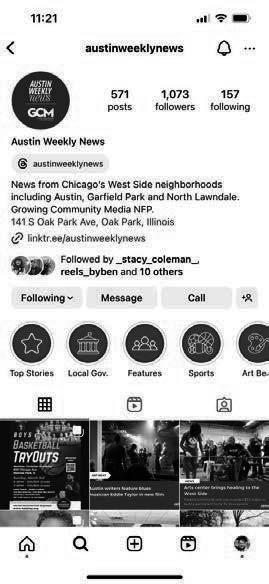
to make any such preferences, limitations or discrimination.
The Illinois Human Rights Act prohibits discrimination in the sale, rental or advertising of real estate based on factors in addition to those protected under federal law.
This newspaper will not knowingly accept any advertising for real estate which is in violation of the law. All persons are hereby informed that all dwellings advertised are available on an equal opportunity basis.
Restrictions or prohibitions of pets do not apply to service animals.
To complain of discrimination, call HUD
CONTRACT 25-408-11
JANITORIAL SERVICES FOR THE MAIN OFFICE BUILDING COMPLEX
Estimated Cost: $2,900,000.00
Bid Deposit: NONE
Optional Pre Bid Walk-Through: Tuesday, January 14, 2025, 10:00 am Chicago Time at the Board Room, located on the 1st Floor of the Main Office Building, 100 East Erie Street, Chicago, Illinois 60611. Voluntary Technical Pre Bid Conference: Wednesday, January 15, 2025, 10:30 am Chicago Time via ZOOM Link
Compliance with the District’s Affirmative Action Ordinance Revised Appendix D, Appendix V, and Appendix C, are required on this Contract.
Bid Opening: January 28, 2025
*****************************************
The above is an abbreviated version of the Notice Invitation to Bid. A full version which includes a brief description of the project and/or service can be found on the District’s website, www.mwrd. org; the path is as follows: Doing Business > Procurement and Materials Management > Contract Announcements.
Specifications, proposal forms and/ or plans may be obtained from the Department of Procurement and Materials Management by downloading online from the District’s website at www.mwrd.org (Doing Business > Procurement & Materials Management > Contract Announcements). No fee is required for the Contract Documents. Any questions regarding the downloading of the Contract Document should be directed to the following email: contractdesk@mwrd.org or call 312-751-6643.
All Contracts for the Construction of Public Works are subject to the Illinois Prevailing Wage Act (820 ILCS 130/1-et.seq.), where it is stated in the Invitation to Bid Page.
The Metropolitan Water Reclamation District of Greater Chicago reserves the right to reject any or all Proposals if deemed in the public’s best interest.
Metropolitan Water Reclamation District of Greater Chicago By Darlene A. LoCascio Director of Procurement and Materials Management
Published in Austin Weekly News January 8, 2025
DEPARTMENTCHANCERY DIVISION
U.S. BANK NATIONAL ASSOCIATION, NOT IN ITS INDIVIDUAL CAPACITY BUT SOLELY AS INDENTURE TRUSTEE, FOR THE HOLDERS OF THE CIM TRUST 2021-R2, MORTGAGE-BACKED NOTES, SERIES 2021- R2 Plaintiff vs. JOHN LYDON AS SPECIAL REPRESENTATIVE FOR NADINE FLOYD, MALCOLM C FLOYD, CRANDALL R FLOYD JR, UNKNOWN HEIRS AND LEGATEES OF NADINE FLOYD, UNKNOWN OWNERS GENERALLY, AND NON-RECORD CLAIMANTS
Defendant 22 CH 6566
CALENDAR 59
NOTICE OF SALE
PUBLIC NOTICE is hereby given that pursuant to a Judgment of Foreclosure entered in the above entitled cause Intercounty Judicial Sales Corporation will on January 15, 2025, at the hour 11:00 A.M., Intercounty’s office, 120 West Madison Street, Suite 718A, Chicago, IL 60602, sell to the highest bidder for cash, the following described mortgaged real estate: SITUATED IN COOK COUNTY, ILLINOIS, DESCRIBED AS: LOT 13 IN BLOCK 3 IN WILLIAM A. MERIGOLD`S RESUBDIVISION DIVISION OF THE NORTH 50 ACRES OF THE EAST HALF OF THE NORTH EAST QUARTER OF SECTION 22, TOWNSHIP 39 NORTH, RANGE 13, EAST OF THE THIRD PRINCIPAL MERIDIAN, IN COOK COUNTY, ILLINOIS. P.I.N. 16-22-205-009. Commonly known as 1219 S. Kedvale Ave., Chicago, IL 60623. The real estate is: single family residence. If the subject mortgaged real estate is a unit of a common interest community, the purchaser of the unit other than a mortgagee shall pay the assessments required by subsection (g-1) of Section 18.5 of the Condominium Property Act. Sale terms: At sale, the bidder must have 10% down by certified funds, balance within 24 hours, by certified funds. No refunds. The property will NOT be open for inspection. Prospective bidders are admonished to check the court file to verify all information. For information call Sales Department at Plaintiff’s Attorney, Altman, Strautins & Kromm, LLC d/b/a Kluever Law Group, 200 North LaSalle Street, Suite 1880, Chicago, Illinois 60601. (312) 236-0077. SPS001425-22FC1 INTERCOUNTY JUDICIAL SALES CORPORATION intercountyjudicialsales.com I3256818
